Searching for Our Voices
Most allegorical tales of triumph conclude with passing through some imposing iron gates, but that’s actually where mine began.
Author’s Note:
I wrote this piece nearly three years ago after I presented at a conference called “Our Voices for Inclusive Classics Pedagogy.” That time was what I now realize was the height of my academic career. I was finishing my dissertation in an exceptionally hot subfield. My first peer-reviewed article was on the verge of publication, and I had recently presented at the Modern Language Association annual meeting, where my conference paper received accolades and attention from several high-ranking senior scholars in the field.
COVID-19 wasn’t yet a household name, and I had never worn a surgical mask in my life. Those two things would change within a month’s time. The academic job market that was barely hanging on with a thread completely collapsed, and everything I had worked for in the past 10 years—my dreams, my hopes, my ambitions—crumbled along with it. In a lot of ways, I am still coping with that loss, and part of my mourning process has been writing for me again rather than writing for work. I hope you enjoy this piece; it’s near and dear to my heart.
Most allegorical tales of triumph conclude with passing through some imposing iron gates, but that’s actually where mine began. Arriving at those austere and figurative portae to knowledge at Columbia University was a surreal experience on the afternoon of Sunday, February 16, 2020.
Their symbolism of epistemological and intellectual enlightenment was impossible to deny. Flanked on either side were two Neo-classical allegorical statues: one of a man grasping the globe of understanding in his hands named scientia, the Latin word for wisdom, and the other of a woman, representing Letters.
She holds a book, which reads “hic labor, haec quies,” an apparent reference to the longer sententiae antiquae from Pliny the Younger:
Hoc sit negotium tuum hoc otium; hic labor haec quies; in his vigilia, in his etiam somnus reponatur.
Let this be your business, let this be your leisure; let this be both your work and your rest.It felt like my entire academic career up to this point was pointing me to this very moment: it was a relief in miniature of my determination to not only enter through the gates designed to keep out the undesirables, but also to speak inside of them about the abusive practices our education systems proliferate in the name of academic “rigor,” a figurative or metaphoric gate-keeping: systems that I’ve come to discover are little more than theater, the cult of busy-ness, and a desire to maintain the status quo.
Our Voices
In my effort to recapture the excitement of this weekend’s conference, Our Voices for Inclusive Classics Pedagogy, I also think through who the “our” in Our Voices is. To be sure, the classrooms in Hamilton Hall at Columbia University were filled with people from various academic backgrounds and professional associations (listed not in order of preference, but in the order they are currently coming to mind): college and university professors, high school teachers, graduate students, undergraduate students, and at least one enterprising high school student.
The crowd of more than 100 attendees was also quite diverse, running the gamut from female scholars and educators; disability advocates; BIPOC scholars, students, and teachers; disability advocates; anti-capitalist funding organizations; and champions of radical pedagogy in the Classics classroom.
As a graduate student in a decidedly non Classics field, I was reticent to present. I came to Latin literature fairly late, in my late-20s. I enrolled in a summer Latin intensive in order to learn Latin to advance my research in early modern history of science.
That summer, I struggled for every ounce of knowledge I acquired in the intensive in which I enrolled. Even though I am finishing my dissertation on how antique myth and philosophy heavily impacted the intersections of early modern literature, religion, and science, I still feel like the dullard in the back of the classroom when it comes to Latin.
It’s nearly impossible to forget the memories of public humiliation because I could not recall the four principle parts of some obscure i-stem verb that I had all of 10 hours to commit to memory with four dozen other vocabulary terms. As I admitted in the prelude to my talk, I know “small Latin and less Greek” (MUCH less, in fact; I know none).
The approach to studying Latin I experienced in this summer intensive was more harmful than helpful. While I acquired the skills to parse the language and literature, that acquisition was in spite of the institute’s outdated grammar school methods.
The students who were the most successful and praised were the ones who had access to private Latin tutors all throughout their middle and secondary educations, who had grown up in the most privileged suburbs and neighborhoods of the Northeast and had been primed their entire lives to attend the Ivy League schools in which they were now enrolled.
They would frequently finish their homework by 6 p.m. every night, while my study group—the stragglers, all of whom were either BIPOC, female, or first-generation college students—would work until 11 p.m., with more than half of the assignments still incomplete.
I look back and realize that this dichotomy was not an accident. As I discussed in my talk on Sunday, much of this structural system was intentional, a hierarchy:
hierarchy, n: a system or organization in which people or groups are ranked one above the other according to status or authority
The hierarchical organization of the intensive classroom guaranteed this outcome. It all also ensured that the students who had been groomed for success in programs like these would stay at the top of the pecking order, while my study group and I struggled to prove that we still belonged there.
This feeling of not belonging exacerbated the imposter syndrome with which I had been coping for years. While I am now in a prestigious PhD program, studying with scholars at the top of the field, it was not without significant work and struggle. I spent hours upon days upon weeks upon months deferring my personal life to the detriment of my relationships, my physical health, and my mental well being. Perhaps the biggest misstep was not visiting my mother regularly in Mississippi because I was so dedicated to proving that I belonged. She would be there after I got where I needed to go, I told myself. She would pass away in August 2015.
I did all of this to prove that I belonged in an academic world that up until recently insisted the likes of me was not welcome. These messages were covert ciphers, to be sure, microaggressions that I now understand as indications of a “leaky” pipeline. They ranged from the undergraduate English professor who said I had no business applying to graduate school (let alone enrolling), to the undergraduate Latin professor who made inappropriate comments to me at a college bar before coming onto me the next semester after I was no longer in his classroom, to the check-ins from a mentor I trusted in my MA program, who constantly asked me if I was “sure” if I wanted to dedicate my life to something so thankless.
(In retrospect I realize now that this last category was in my best interest; graduate school is thankless, but when a first-generation student has been shut out from the ivory tower for so long, is it any wonder that she interprets these near-constant questions not as mentorship but as a persistent reminder that “you don’t belong here—then, now, ever”? I often wonder if they ever asked their male students that same question.)
Dismantling the Hierarchy
I ultimately decided to participate in Our Voices, of course. And this organization is very much committed to altering the dominant narrative of hegemony, abuse, and power imbalance in a field that excludes a massive fraction of those who are mesmerized by its magnetic pull. That I was an outsider, I came to realize, was the entire point. The keynote speakers made clear the emotional toll that dismantling the abusive power structures takes, and it is still difficult to grasp the amount of brilliant minority scholars we have lost to our subsequent whitewashed fields.
The talk I gave, “Enraptured: Reading Ovidian Sexual Violence in Early Modern Literature,” focused on my experience teaching sexual violence in early modern literature to an undergraduate classroom of all-male students in classics.

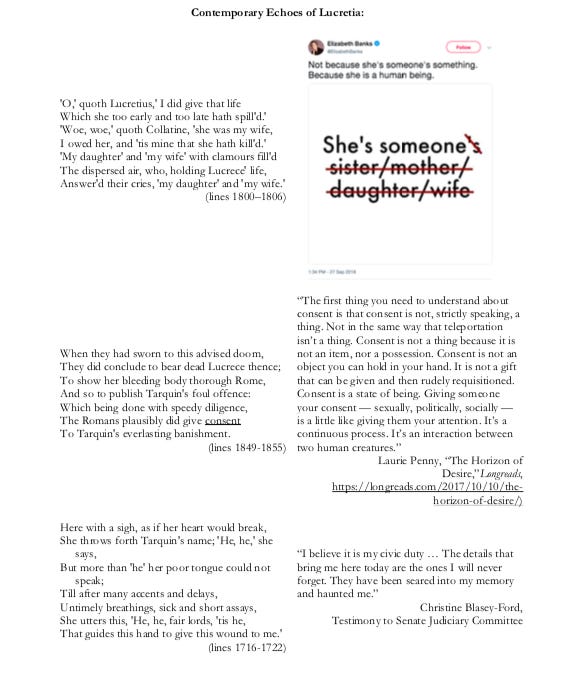
In particular, I focused on reevaluating and interrogating the project of remembering that Renaissance humanists conducted in order to build the field we now call the classical world.
What stuck out to me while I gave this talk was that, in the process of explaining to my audience the long tradition in early modern literature of Ovidian reception—particularly the tales of sexual violence—I found myself on the verge of tears. This reaction is unusual for me. Firstly, while I find my research area exciting, it often does not describe, in detail, the traumatic victimization of women. Secondly, when I do discuss these facets of these early modern conventions, it is usually with colleagues and friends, over coffee or wine and without the furnishings of carefully crafted rhetorical choreography to drive home the powerful ramifications of our collective pain and trauma.
For everyone in attendance, both physically and virtually, Lucretia’s and Philomela’s pain was our own. The fictional representations of these women were all of us, their bodies and consciences invaded by abusers who viewed them them not as people, but as commodity, as property—to be used, traded, and discarded for the sake of reifying hierarchical dominance.
Holding space for their vulnerability in Hamilton 516 also meant holding space for everyone at that conference. In turn, my talk and all of the others functioned as our own project of remembering, which in turn meant recalling and holding space for our narratives of experience that have been silenced by the status quo of hierarchies, the “rigorous” structure of academic departments.


And as I emphasized in a recent tweet, I have come to own the power of my voice choking back tears. I realized that this is what happens when we take a moment to think deeply about the symbolic and narrative importance of vulnerable people: to examine closely the state of woundedness, of incompleteness, catalyzed by the the traumatic invasion that power structures perpetuate on our minds and bodies. Our very terminology gets to the core of this state of being, and its root is derived from the Latin etymon vulnus—that is, a wound.
We have something to learn from vulnerable people, a fact that Ovid and his contemporaries knew well. It is not an accident that the mythologies of wounded gods, mortals, and monsters are the ones that pervade our consciousness, for they contemplate the connection between physical, mental, and emotional vulnerability.
On that Sunday afternoon, I didn’t arrive at those gates alone. I carried with me the countless advisors, cheerleaders, mentors, and friends who saw things in me and my peers that those with more “rigorous” academic backgrounds either accidentally overlooked or purposefully refused to see in the first place. It took determination and brute force, but I crossed the limina of those gates, ready to speak this pedagogical and personal project into existence, ready to remember why we all gave up our weekends to convene at a campus known both as a site of cultural capital and perpetuating the institutional erasure of women’s voices and experiences.
līmen , ĭnis (līmina) a cross-piece, threshold
I realized in the process that it did not matter if my voice cracked with pain as I openly mourned the violation Lucretia, Philomela, and all the women—past, present, and future—who attempt to recuperate from the violence enacted upon them.
My voice is my own, even when—perhaps especially when—it rasps through the more violent and invasive aspects of my prepared remarks. We become stronger when we empathize, and critical understanding of the text does not necessitate apathetic distance from the topic at hand. Why is it that we continue to strive for inclusive spaces when the power structures around us continue to double down on their discrimination? Perhaps the answer lies in the simple prose that nearly gutted me, my gnarled voice betraying my emotional pain:
Lucretia is not just someone’s daughter, someone’s wife. Lucretia is someone.
Nostrae Voces, Ita Vera.
Our Voices, Indeed.
———





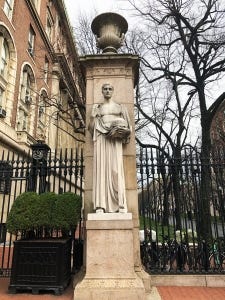
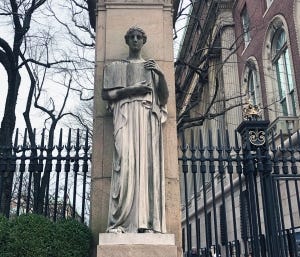

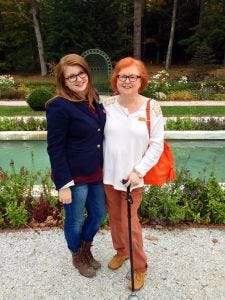
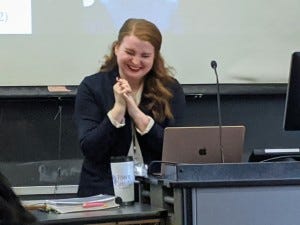
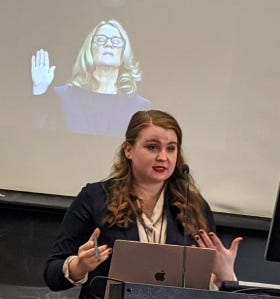
Thank you for sharing this, Alex. It is so interesting to see behind the scenes into this world. I didn't realize you had a Mississippi connection. My people are from rural Mississippi, and I spent a lot of time there as a child and adolescent.